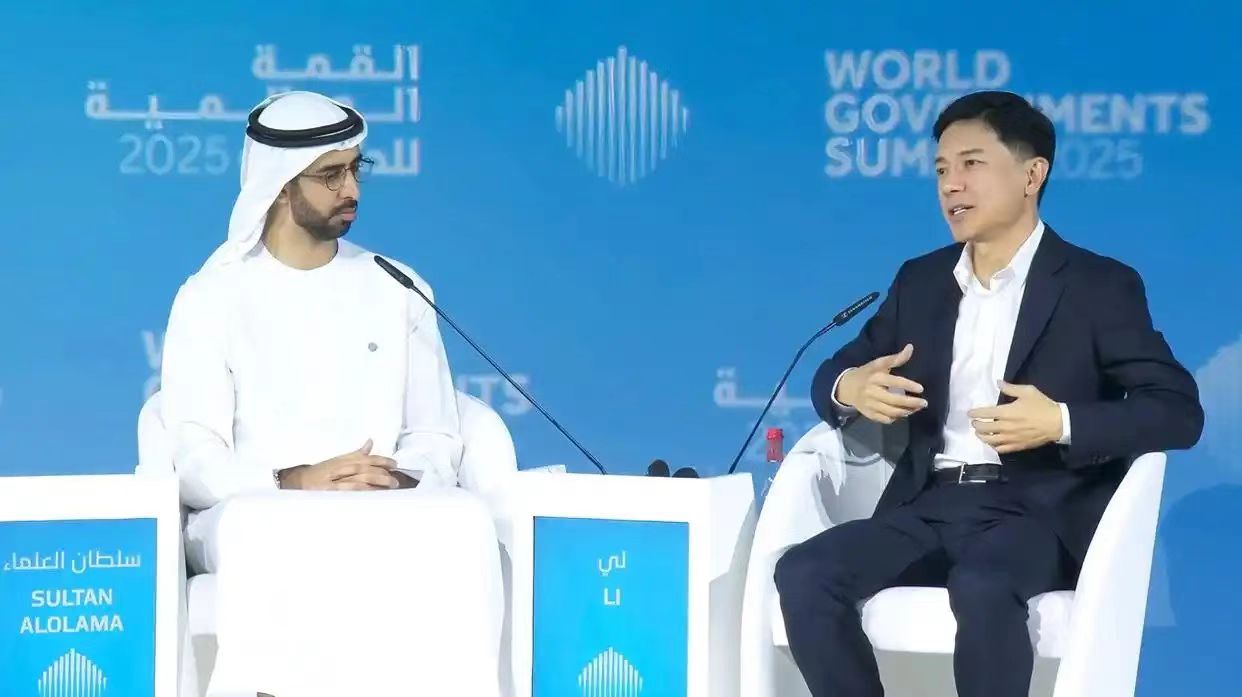Navigating the DeepSeek Phenomenon: Robin Li on the Urgent Quest for Super AI Apps Like WeChat
![]() 02/12 2025
02/12 2025
![]() 611
611

Radar Finance News | By Jiangbei | Edited by Shenhai
As DeepSeek captures global attention, AI has once again ascended to the forefront of global discourse.
On February 11, during the 2025 World Governments Summit in Dubai, UAE, Baidu founder Robin Li engaged in a dialogue with the UAE's Minister of AI, Omar Sultan Al Olama, offering his first insights into AI-related matters amidst the DeepSeek upsurge.
Addressing how to gauge the ROI of AI, Robin Li emphasized that despite advancements and cost reductions, sustained investment in AI infrastructure remains crucial to maintaining a technological frontier position.
He further stated that to justify the trillions invested in "large models," the development of these models must prioritize value creation at the application layer. Specifically in the To C sector, the market has yet to witness a super app akin to WeChat or Facebook. Robin Li believes the world is currently on an eager hunt for such super apps.
When queried about the anticipated emergence of DeepSeek, Robin Li responded, "Innovation cannot be premeditated." Instead, he stressed the importance of fostering an environment conducive to innovation, a feat already achieved domestically.
The Urgent Quest for a WeChat-Like Super App in the To C Market
Public data reveals that from early 2024 to present, Microsoft, Meta, Google, and Amazon have collectively invested $125 billion in AI and data centers, with projected annual investments surpassing $218 billion. However, these expenditures have yet to yield immediate returns.
Consequently, following DeepSeek's success with low-cost computing power, a consensus has emerged: the substantial expenditures of tech giants may not be commensurate with actual returns. This trend has significantly impacted the valuation of U.S. tech stocks.
Robin Li shared his thoughts on this matter at the Summit. Addressing the question of AI investment and cost recovery, he underscored that the rapid pace of technological advancement in AI, with annual cost reductions of about 90% and performance enhancements, remains the fundamental theme. In such a dynamic landscape, companies must invest to stay at the forefront of innovation.
"We must continue investing in chips, data centers, and cloud infrastructure to build better, smarter next-generation models," he said.
Discussing the AI investment-output relationship, Robin Li noted that large language models have already demonstrated significant value in various To B scenarios, such as enhancing efficiency in recruitment, e-commerce, healthcare, and even energy and electricity. However, the challenge lies in the To C segment.
In the To C sector, Robin Li observed a lack of super apps with hundreds of millions of daily active users, akin to those seen in the mobile internet era or social media platforms where users spend upwards of two hours daily.
"Such an opportunity has yet to present itself, but I believe someone will eventually find a solution. For instance, ChatGPT boasts a DAU/MAU ratio of 16%, whereas platforms like Facebook or WeChat hover around 90%," he said.
"We are still far from achieving that level of application. I believe the world is currently on a quest for such a super app," Robin Li concluded.
The Domestic Innovation Environment That Nurtured DeepSeek
At the Summit, Robin Li also delved into the reasons behind DeepSeek's emergence in China.
He attributed the advent of large models like DeepSeek, characterized by "high performance" and "low computing power costs," to the domestic AI innovation environment.
"Innovation cannot be scheduled," Robin Li emphasized. "You cannot predict when and where it will occur. What you can do is create an environment that fosters innovation."
For DeepSeek, a favorable macroenvironment has been the significant progress made in domestic large models over the past year.
"Baidu's technical roots lie in search engines, which inherently align with large language models. That's why we launched ERNIE Bot in March 2023, becoming the first listed company to introduce a ChatGPT-like application. Subsequently, Google launched Bard and renamed it Gemini. It's an exhilarating time; innovation is evident everywhere, and we must adapt to this rapid pace," he said.
For Chinese companies, the cost environment is more stringent, necessitating innovations in reasoning and training to reduce costs.
Robin Li cited Robotaxi as an example, explaining that in the U.S. or more developed markets, ride-hailing prices are significantly higher than in China. Therefore, even a Robotaxi costing $100,000 can be profitable through self-driving. In China, however, ride-hailing prices are lower, necessitating a much lower-cost technology for self-driving. Thus, to a certain extent, China is compelled to innovate for cost reduction.








